(Please read Parts I, II, III, IV, and V before this article)
The final chapter concerning the Law of Hybrid War’s applicability to the Balkans concludes with the Republic of Macedonia, the country that’s arguably the most at risk of being torn apart by the US’ schemes. It satisfies almost all of the socio-political vulnerabilities identified by the theory as being conducive to Hybrid War, and it’s on the verge of an historical election in April 2016 that could be manipulated as a pretext for setting a destructive scenario into motion. At the same time, however, Macedonia has already proven itself to be incredibly resistant in defending itself against a nearly identical scenario back in May 2015, during which it defied what many foreign observers had assumed to be a fait accompli regime change event.
The world was thenceforth witness to the only instance when a serious Color Revolution attempt was peacefully repelled by the population, proving that patriotism is an invaluable defense against the first stage of Hybrid Warfare. Complementary with that, the security forces busted an Albanian terrorist ring right beforehand that was planning to provoke an Unconventional War in parallel with the Color Revolutionaries, thankfully negating this destabilizing variable before it had a chance to kill civilians. Taken together, the positive and trustful interplay between the people and the state demonstrated a new and effective model for combating Hybrid Wars, and the lessons that it taught the world mustn’t be forgotten. That being said, the Macedonia of April 2016 has had one year of intensive social and structural preconditioning to prepare it for an upcoming Hybrid War scenario, meaning that the threat is just as, if not more, acute during the upcoming elections than it was in May 2015.
Bullseye
The Republic of Macedonia is targeted for Hybrid War due to its prime geostrategic position along the Balkan Stream and Balkan Silk Road routes, but the country is socio-politically more vulnerable than any of the other transit states, thus making it an irresistible target for the US.
Geostrategic:
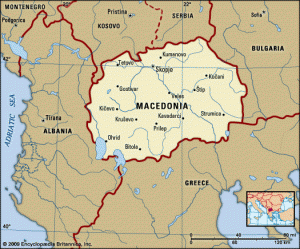 Recalling the route of both multipolar megaprojects, their point of their confluence is in the Republic of Macedonia, not Greece, since they don’t begin to run parallel to one another until after they cross the border. This means that Macedonia is the crucial ‘neck’ connecting both projects with the Balkan hinterland. Greece is of course important as an access point in general, but Balkan Stream and the Balkan Silk Road traverse it from different directions, so the most efficient chokepoint in which pressure could be applied to undermine both of them concurrently is in Macedonia. If a high degree of destabilization were to break out in the country or a rabidly pro-American government came to power, then it’s unlikely that either project would have much of a future afterwards, thus accomplishing the US’ primary goal and explaining the premier geopolitical importance of Macedonia in the Balkan strategic configuration.
Recalling the route of both multipolar megaprojects, their point of their confluence is in the Republic of Macedonia, not Greece, since they don’t begin to run parallel to one another until after they cross the border. This means that Macedonia is the crucial ‘neck’ connecting both projects with the Balkan hinterland. Greece is of course important as an access point in general, but Balkan Stream and the Balkan Silk Road traverse it from different directions, so the most efficient chokepoint in which pressure could be applied to undermine both of them concurrently is in Macedonia. If a high degree of destabilization were to break out in the country or a rabidly pro-American government came to power, then it’s unlikely that either project would have much of a future afterwards, thus accomplishing the US’ primary goal and explaining the premier geopolitical importance of Macedonia in the Balkan strategic configuration.
Socio-Political:
Facilitating the US’ geostrategically disruptive plans for the Balkan multipolar megaprojects are the socio-political vulnerabilities inside the Republic of Macedonia that make it very susceptible to outside manipulation. Here’s a brief overview of how they stack up in accordance with the six characteristics most closely associated with the Law of Hybrid War:
Ethnicity
The last census from 2002 lists the population as being 64.2% Macedonian and 25.2% Albanian. This is important not only terms of the potential for externally provoked ethnic conflict, but also because of how it relates to the country’s government per the precepts of the Ohrid Agreement. Proportional parliamentary representation is mandated into law as a result of that document, thereby meaning that if a forthcoming census revealed a staggering increase in the number of Albanian citizens, then this would have direct consequences on the composition of the government. It could also potentially exacerbate tensions in and of itself, especially if there was reason to suspect that the new Albanian population figures were forged in some way (e.g. an “opposition”-led government exaggerates the number as a form of ‘thanks’ to their Albanian Hybrid War supporters and as a way to ‘legitimize’ the preplanned federalization of the country).
Religion
Herein lays another potential source of societal division which perfectly overlaps with the ethnic composition of the country. Almost all ethnic Macedonians are Orthodox Christians while just about every Albanian is Muslim, and despite the latter’s traditional secularity, the growing Islamization of Muslim communities all across the world (especially in the Balkans as part of Turkey’s Neo-Ottoman societal preconditioning) is a cause for concern that could provoke identity conflict in historically Christian countries like Macedonia. The other problem of course is ISIL, and Macedonia arrested 9 people for ties with the terrorist group back in August (they were still looking for another 27 that evaded capture at the time), showing that there is a very disturbing possibility that the organization has already established a deeper network within the country. Seeing as how most of Macedonia’s Muslims are Albanian, there’s a very strong chance that this means that ISIL has co-opted members of this demographic and could thus try to put a ‘caliphate’ spin on the Greater Albania rallying cry in order to doubly maximize these two destructive ideologies. Chillingly, Macedonia is also included in ISIL’s five-year plan for creating a worldwide ‘caliphate’, so it’s already a target as it is.
History
The Republic of Macedonia has a wealth of history that stretches back for millennia, but to concisely connect it with the present, one should harken back to the dark days of World War II when Fascist Albania and Bulgaria teamed up in annexing the territory between themselves. While it’s true that there was no internationally recognized administrative entity called “Macedonia” at the time (it was part of Vardar Banovina in the Kingdom of Yugoslavia), that doesn’t mean that there was no such thing as ethnic Macedonian identity, which had actually been divided between Serbia, Bulgaria, and Greece after the Balkan Wars prior to World War I.
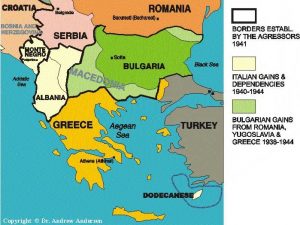
The reason that World War II is taken as the point of departure in this study is because both Albania and Bulgaria are once more flexing their expansionist ideologies, and although they might not seek to physically occupy Macedonia like they did in World War II, that doesn’t mean that they’ve abandoned their hegemonic ambitions towards it. Greece is also an irritant because of the long-lasting name issue that Athens refuses to budge on, despite this turning out to be a blessing in disguise in hindsight because it prevented Macedonia’s earlier pro-Western governments from rushing them into the EU and NATO. The importance of Macedonia’s shady neighbors will be discussed in the next section of the research that’s dedicated entirely to them, but at this point, it’s just important to recognize that neither of those three aforementioned governments has Macedonia’s best interests in mind, and that they wouldn’t hesitate to undermine it for their own self-interests if the opportunity arose.
Administrative Boundaries
The Republic of Macedonia is divided into 80 municipalities spread out over 8 statistical regions. The three most important of the latter in relation to this study are the Skopje, Polog, and Southwestern Regions because they encompass the vast majority of the country’s Albanian population. Furthermore, Polog Region is the only one to actually have an Albanian majority, and taken together, this demographic is heavily concentrated in an arc running along most of Macedonia’s western border. This demographic setup doesn’t correspond to the rest of the country’s regional borders, so the case can provocatively be made (as the ‘opposition’ is intimating it would like to do if it seizes power) that they should be redrawn in order to give an even stronger sense of representation and “separateness” to the Albanian population. Of course, this would be nothing more than a pretense for formalizing a divisive and unnecessary form of Bosnian-like federalization engineered to keep the country in a state of constant tension and forever hinder its governing efficiency.
Socio-Economic Disparity
This socio-political vulnerability is a bit harder to accurately assess, since even though it’s speculated that ethnic Albanians have a relatively lower standard of living than ethnic Macedonians, it’s still a lot more better than would experience in Albania or the occupied Serbian Province of Kosovo. Additionally, there’s no concrete evidence proving that the suggested difference in living conditions is wide enough to warrant any significant disconnect between the two ethnic groups. Furthermore, when speaking in general terms, Macedonia is one of Europe’s economic success stories in recent years, with its economy maintaining growth despite the crisis that has crippled the rest of the continent. This means that any relative socio-economic disparities between ethnic Albanians and Macedonians are still less pronounced than between other demographics all throughout Europe, seeing as how both could be inferred to have benefitted from the country’s recent growth while their counterparts simply suffered. Therefore, out of all of the socio-political vulnerabilities present in the Republic of Macedonia, this one is the weakest and least substantial of the bunch, although the manipulated perception of a divide could be a handy instrument for the US to use in agitating the Albanians against the ethnic Macedonians.
Physical Geography
This last Hybrid War-facilitating characteristic certainly plays to the US’ favor. It’s already been established that ethnic Albanians constitute a quarter of Macedonia’s population and are heavily concentrated in the western border regions of the state. As ‘luck’ would have it, these are also the hilliest and most mountainous portions of the country, which are of course ideal for guerrilla warfare and other types of unconventional aggressions. In the event that a critical mass of Albanians could be misled into organizing against the government and taking up arms after a failed Color Revolution, the risk is extraordinarily high that they’d be tactically successful and capable of prolonging their insurgency for an indefinite period of time. This scenario becomes even more pronounced when one figures that Albania could easily exploit these geographic features in order to siphon weapons and fighters across the border to maintain the terrorist uprising against the state.
Shady Neighbors
It was earlier touched upon that three of Macedonia’s four neighbors harbor negative intentions towards its independent statehood, so at this point, it’s necessary to expand upon that and put it into the context of Hybrid War theory. The reader should keep in mind that only national governments are being referred to as having deep-seated ulterior motives towards Macedonia, and that not all of these countries’ citizens share their authorities’ implicit views:
Albania:
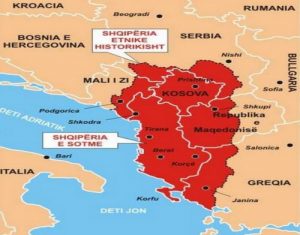
Having reached this final chapter and read through the previous elaborations about Greater Albania, it should already be self-explanatory why Tirana is dedicated to destabilizing its neighbor. To add a little more to the depth of knowledge that’s already been established, Albania would ideally like to create a “Balkan Benelux” to institutionally solidify the full-spectrum hegemonic foundations for Greater Albania as a step prior to or in place of a formal Kosovo-like occupying partition of Macedonia. Tirana isn’t interested in the entirety of the country’s territory since its ambitions strategically stop at the edge of the Albanian-populated parts of Macedonia (mostly overlapping with the Fascist-era imposition of Greater Albania), but it would of course aspire to gather control of the ethnic Macedonian-administered economic resources there as well. The quickest way to appropriate such businesses from their existing and rightful owners would be to either federalize the country and rewrite legislation that changes each new region’s administrative, legal, and tax codes to support these ends, or initiate a Kosovo-like ethnic cleansing campaign against the native inhabitants and forcefully occupy their establishments afterwards. The first option is the more ‘peaceful’ of the two and has the greatest chance of leaving the said businesses functionally intact, while the latter would almost surely result in a Kosovo-like failed ‘state’ emerging in Macedonia’s western Albanian-inhabited regions.
Bulgaria:
Macedonia’s culturally and historically close neighbor has never quite come to terms with the country’s independence and separate sense of national identity. Bulgarian nationalists believe that there’s no such thing as the Macedonian ethnicity, culture, or language, and that it’s all just a sub-standard form of Greater Bulgaria. This attitude isn’t officially displayed, but it is tacitly employed whenever Bulgaria tries to condescendingly behave as a ‘big brother’ to Macedonia, notably in trying to ‘guide’ it towards EU and NATO membership. The ‘shared institutionalism’ that Bulgaria hopes to enter into with Macedonia is just a tactical front for enhancing its viability to control the affairs of its neighbor, a form of Western-spearheaded neo-imperialism with Sofia acting as the ‘good guy’ Lead From Behind proxy.
This form of influence imposition isn’t the same as the militant occupation that occurred during World War II, but it’s rather a more subtle, albeit no less effective, way of making sure that Macedonia remains under Bulgaria’s sway. Most strikingly, when Macedonia was at its most vulnerable point in recent years when it was undergoing the Color Revolution attempt in May 2014, Bulgaria provocatively moved its military to the border in order to guard against non-existent ‘terrorists’, but in reality to apply intimidating anti-government pressure against the authorities. As the cliché goes, ‘actions speak louder than words’, and although Greater Bulgaria isn’t formally espoused by Sofia or its leading representatives, its physical manifestations and symbolic overtones say the opposite. Given how Bulgaria has behaved during the past 24 years of Macedonian independence, it’s very probable that it’ll continue its course of tacitly hegemonic action and mischievously seek to exploit any further destabilization that its neighbor experiences in order to promote this end.
Greece:
The naming dispute between Greece and Macedonia is the most serious impediment to bilateral relations, and this single issue has very deep historic and identity undertones for both sides. Without getting into the nitty-gritty details of the surrounding this spat, it is generally understood that the Republic of Macedonia simply wants to uphold its national identity while Greece will stop at nothing in its quest to bully its historically verifiable neighbor into accepting a ‘compromise name’ that refutes its nationhood and overall existence. This issue is of such obsessive importance to Greece that Athens has repeatedly refused to allow Macedonia into the EU and NATO at the time when its pro-Western government was most sincerely eager, thus ironically creating the situation where the country is now one of the last independent places in the continent.
Applying the naming dispute to contemporary political relations between the two neighbors and its relevance to Hybrid Wars, it’s undeniable at this stage in time that Greek authorities were purposely facilitating the transport of hundreds of thousands of “refugees” to the Macedonian border. They didn’t send them in the direction of Albania or Bulgaria, but specifically to the Republic of Macedonia, suggesting that some Greek authorities may have had spiteful intentions to subvert the stability of their neighbor due to the naming dispute. It may not be that there was even any official policy in this regard, but that the local Greek authorities, when debating where to send the “refugees” off to, mostly all decided on the Republic of Macedonia as a means of payback for having not compromised on their identity.
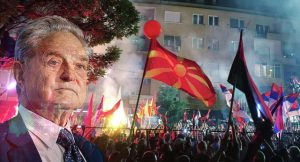 Additionally, all Greeks were aware of the Color Revolution instability that threatened the government in May 2015, so from their standpoint, sending another source of disorder into their borders might help tilt conditions one way or another towards the Greek-friendly ‘opposition’ (Zaev has hinted that he would accept a compromise name if he seized power). It’s telling that there has been a concerted campaign in the international media since then by Soros-affiliated organizations in trying to smear the ruling government for a ‘mishandling’ of the “refugee” crisis. There was probably no coordination between the local Greek authorities’ unethical and irresponsible shipment of an overwhelming mass of “refugees” to the Republic of Macedonia and the Soros-linked groups, but that the latter instantly saw an opportunity to capitalize on the former and wasted no time in getting to work.
Additionally, all Greeks were aware of the Color Revolution instability that threatened the government in May 2015, so from their standpoint, sending another source of disorder into their borders might help tilt conditions one way or another towards the Greek-friendly ‘opposition’ (Zaev has hinted that he would accept a compromise name if he seized power). It’s telling that there has been a concerted campaign in the international media since then by Soros-affiliated organizations in trying to smear the ruling government for a ‘mishandling’ of the “refugee” crisis. There was probably no coordination between the local Greek authorities’ unethical and irresponsible shipment of an overwhelming mass of “refugees” to the Republic of Macedonia and the Soros-linked groups, but that the latter instantly saw an opportunity to capitalize on the former and wasted no time in getting to work.
As childish of a reasoning as it may seem to most readers for Greece to undermine its neighbor with hundreds of thousands “refugees” simply because of a naming dispute, it’s actually quite ‘logical’ from the Greek perspective because of how important of an issue this has become in terms of national identity. Greece probably wouldn’t ever get directly involved in any Hybrid War that could break out in the Republic of Macedonia, but it’s already done enough disruptive structural preconditioning to deal damage to the country in such an event. Taking this understanding even further, it can also be argued that the uncontrollable “refugee” influx that Greece facilitated (remember, it didn’t direct them towards Albania or Bulgaria) had helped contribute to a more unstable domestic situation in Macedonia, with an unknown number of stay-behind terrorists that may have slipped in by this point (outside the knowledge of the Greek authorities, of course) that could be activated when the Hybrid War signal is potentially given during the April 2016 early elections.
Avoiding Collapse
The US wants to push Macedonia onto the path of externally engineered self-destruction timed to coincide with the April 2016 early election, but it doesn’t mean that Washington’s plans are inevitable. It’s very possible that Macedonia will once more repel the asymmetrical onslaught being planned against it, but provided that it recognizes the true nature of the threat that it’s against this time around and engages in the proper preparations to offset this scenario.
US Strategy:
The US’ Hybrid War plot against Macedonia is composed of three rapidly progressing steps that are designed to throw the country into chaos shortly after their implementation.
Last-Minute Provocations
The ‘opposition’ has already carried out a spate of political provocations against the government, but it’s likely that they’re saving their ‘best’ stunts for right before the 5 June early election date. It’s impossible to know with pinpoint accuracy exactly what this might entail, but a reasonable guess is that it would deal with something related to the Western intelligence agency-manipulated ‘wiretaps’. Another possible scenario is that ‘opposition’ members inside the transitional government (to be formed in the 100 days leading up to the vote) could engage in some sort of ‘inside’ provocation to produce an outrageous last-minute scandal that misleadingly implicates the government and forces it into an abrupt damage-control campaign that it’s ill-suited to wage one or two days before the actual election. A combination of both possibilities (an ‘inside’ provocation made worse by a related ‘wiretap’ leak) is also conceivable.
There’s also the risk of a terrorist provocation breaking out at the last minute as well, and this would more than likely involve a Kumanovo-like KLA cell actually being success in carrying out one or more attacks. The purpose behind this sort of provocation is to rile up the Albanian community so that they can be misled by Western-allied ‘community leaders’ into boycotting the election en mass and/or marching against the government on the day of the election. Either or would seriously destabilize the vote and call into question the ballot’s legitimacy if it turns out that most of the Albanian community (estimated to be at least 25% of the population and holding an equal proportion of parliamentary seats per the Ohrid Agreement) purposely chose to abstain from participating. This would provoke a loud outcry from the West, which would throw its full support behind the protesting Albanians and call for the invalidation of the vote and/or the resignation of the ruling VMRO party. Failure to accommodate these demands would give the US the green light for intensifying its regime change plot against Macedonia.
Post-Election Destabilization
There are two main branches that the post-election destabilization of Macedonia can take, dependent of course on how the ‘opposition’ fares. If they don’t do as well as they expect (which the polls indicate will most likely happen), then they’ll reactively take to the streets in protest (possibly after recruiting some “refugee” supporters as well) and attempt to follow the exact same template as during May 2015. The key differentiator, however, is that they’ll do whatever they can to dupe many of the Albanians into going along with them, having learned that the absence of this critical demographic is largely to blame for why their earlier protests fizzled out and lost international media support. The challenge is that the Albanians do not want to disturb the ethnic harmony that has already resulted in so many benefits for them since the Ohrid Agreement was implemented, and they already proved their loyalty to a unified Macedonia by resisting the temptation to organize against the government last time. Due to the strategic necessity of having them involved in the ‘opposition’s’ post-election Color Revolution attempt (the main lesson learned from May 2015), it is highly probable that some type of false-flag provocation will be attempted at this time and blamed on the government.
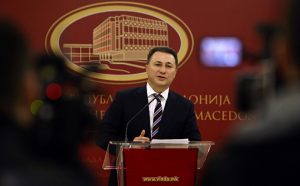 The other foreseeable scenario branch that could develop after the elections is if the ‘opposition’ finds a way to rig the polls and win, which would immediately prompt a counter-Color Revolution movement by the country’s pro-government supporters and patriotic citizenry. This time, however, they won’t be presented as status-quo actors trying to maintain stability, but as sore losers disgusted by ‘democracy’ and trying to intimidate the ‘victors’ into nullifying the ballot. It should go without saying that this altered context (there was no election during the May 2015 Color Revolution) makes all the difference in terms of how the West will respond, since the US and the EU will predictably paint the Macedonian patriots as violent insurgents (perhaps even as “terrorists”) and will absolutely never recognize any political successes that they may have in rolling back the Color Revolution coup that was just carried out. Even if they were to suddenly recoup their institutional losses and find a way to invalidate the fraudulent poll, the country would be placed under intense Western sanctions until the ‘opposition’ is able to once more seize control of the government whether through the ballot or the bullet.
The other foreseeable scenario branch that could develop after the elections is if the ‘opposition’ finds a way to rig the polls and win, which would immediately prompt a counter-Color Revolution movement by the country’s pro-government supporters and patriotic citizenry. This time, however, they won’t be presented as status-quo actors trying to maintain stability, but as sore losers disgusted by ‘democracy’ and trying to intimidate the ‘victors’ into nullifying the ballot. It should go without saying that this altered context (there was no election during the May 2015 Color Revolution) makes all the difference in terms of how the West will respond, since the US and the EU will predictably paint the Macedonian patriots as violent insurgents (perhaps even as “terrorists”) and will absolutely never recognize any political successes that they may have in rolling back the Color Revolution coup that was just carried out. Even if they were to suddenly recoup their institutional losses and find a way to invalidate the fraudulent poll, the country would be placed under intense Western sanctions until the ‘opposition’ is able to once more seize control of the government whether through the ballot or the bullet.
Beginning The Hybrid War
The course of Hybrid War events is obviously dependent on what happens in the immediate post-election aftermath, but any instances of street violence between the patriots and the ‘opposition’ could enflame tensions in the country and push one or the other side (depending on who won the election and which side is protesting against the other) into taking up arms against the government and rapidly transforming a failed Color Revolution into an Unconventional War. Additionally, an outbreak of physical conflict between ethnic Macedonians (whether patriots or ‘opposition’) and ethnic Albanians would also push the country closer to the abyss. The most feasible way that either side could come out on top in the case of armed conflict is if they have the support of the ethnic Albanian community, but it’s also probable that this demographic might be split amongst itself over who to support. In such a situation, the strategic odds would be up in the air and it would be extremely difficult to tell whether the patriots or the ‘opposition’ would win.
As the country enters into a free-fall scenario of collapse, the irredentist lust of Greater Albania and Greater Bulgaria will start to kick in, with Tirana supporting terrorist Albanians and Sofia lying in wait to make a move in invading the majority-ethnic Macedonian territories. Per the latter scenario, Bulgaria could do this either under the guise of being ‘call in’ to help (whether by an ‘opposition government’ or as a flat-out of aggression against the legitimate authorities) or in protecting its borders from ‘terrorism’ (the same reason why it commenced the military buildup in May 2015). There’s actually a real risk of genuine Albanian- and/or “refugee”-affiliated terrorism to break out concurrently amidst the discussed crisis, meaning that Bulgaria might actually have a convincing enough argument to use if it decides to go along this route. However, it’s unlikely that any there’ll be any outbreak of terrorism near its borders, so it would foreseeably be abusing the domestic situation inside Macedonia to advance its own ends, much as how Turkey and the Western powers are doing in Syria nowadays.
The end goal of both shady and irredentist neighbors is to divide Macedonia amongst themselves, using the American-manufactured crisis in the country as the catalytic pretext for doing so. Albania’s support of its ethnically affiliated terrorists is founded on the principle that they’ll accelerate the creation of Greater Albania, whether in the form of a quasi-independent federalized Albanian portion of Macedonia, an artificial and occupied entity like Kosovo, or outright annexation such as during the fascist years. If successful in either of these iterations, Macedonia in its current form will cease to exist and the nation will be greatly weakened as a result, thus opening up the door for Bulgaria to swoop in via the direct or indirect application of its hegemonic intentions. It’s conceivable that it could even work in tandem with Albania to bring about the partition of Macedonia, using the ‘argument’ that the independent or de-facto independent Albanian-populated portions of the country create an internal imbalance that can only be rectified by the rump state’s closer relations with Bulgaria, ostensibly on the basis of security. If it comes to this, then Macedonia will become a junior partner to Bulgaria, and the dreams of some in Sofia to recreate Greater Bulgaria will be a lot closer to reality than they ever have been since the end of World War II.
Macedonia’s Defense:
Despite the meticulously planned mayhem that the US plans to provoke in the Republic of Macedonia, it doesn’t mean that the doom and gloom will ultimately succeed. The greatest defensive advantage that Macedonia has going for it is its world-renowned patriotism that crushed the first Color Revolution attempt. In the run-up to its second iteration, it’s imperative that the Macedonian authorities and patriotic civil society elements continue to emphasize the traitorous scheme being hatched against their country. It’s important that the average citizen is reminded of the external support that the ‘opposition’ has, and how their country is just a pawn in a larger geopolitical New Cold War proxy offensive that the US plans to wage against Russia and China’s multipolar megaprojects. If regular folks understood the enormity of what’s at stake and the lengths that the US might be going to achieve them, then they’d be less susceptible to any last-minute provocations that the ‘opposition’ might be planning. Additionally, emphasizing the government’s successful economic track record and visible infrastructure growth since 2006 would be an effective and easily relatable way to remind voters of what could be overturned if the ‘opposition’ wins or commences a Hybrid War to seize power.
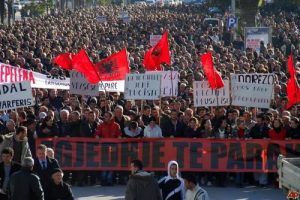 What’s undeniable, however, is that the government and its fellow patriots need to appeal to the Albanian minority in order to maintain long-term stability. This means that their supportive manifestations must be inclusive and not geared entirely towards ethnic Macedonians. Doing so would give off a negative message and play right into the hands of the ‘opposition’s’ information warfare campaign which falsely alleges that the government doesn’t care about their interests. Some ways in which the artificial Soros-driven narrative could be effectively countered include promoting the success that Albanians have experienced since Ohrid, underlining that Albanian-Macedonians have higher living standards than if they lived anywhere else in the region (i.e. Albania and the occupied Serbian Province of Kosovo), and reminding them that the Democratic Party of Albania is in a coalition partnership with the ruling VMRO government.
What’s undeniable, however, is that the government and its fellow patriots need to appeal to the Albanian minority in order to maintain long-term stability. This means that their supportive manifestations must be inclusive and not geared entirely towards ethnic Macedonians. Doing so would give off a negative message and play right into the hands of the ‘opposition’s’ information warfare campaign which falsely alleges that the government doesn’t care about their interests. Some ways in which the artificial Soros-driven narrative could be effectively countered include promoting the success that Albanians have experienced since Ohrid, underlining that Albanian-Macedonians have higher living standards than if they lived anywhere else in the region (i.e. Albania and the occupied Serbian Province of Kosovo), and reminding them that the Democratic Party of Albania is in a coalition partnership with the ruling VMRO government.
In terms of structural defenses, the Macedonian government must absolutely find a way to control the “refugee” influx into the country, taking resolute measures to defend the exposed portions of the border and guide individuals into orderly processing facilities. Afterwards, the authorities should track, or if possibly, accompany the “refugees” as they transit Macedonia, ideally reaching a coordinated agreement with Serbia and other ‘downstream’ Balkan states to expedite these individuals’ removal from the Balkans and speedy transport to Central, Northern, and Western Europe. Of course, legitimate refugees who sincerely desire to integrate and assimilate into Macedonian culture should be allowed to remain, as per the country’s ethical commitment to UN legislation, but anyone not fulfilling these criteria poses a security threat to the country and should be hastily removed in one direction or the other. Along these same lines, it’s integral for the military to remain on high alert all throughout this time, as they need to swiftly react to any outbreak of Albanian- and/or “refugee”-affiliated terrorism, both before, during, and immediately after the early election results. The professionalism of the security services is thus the necessary structural complement to the social support given by the patriotic population, and if these two democratic security elements continue to interact seamlessly in the future, then there’s a very high probability that the Republic of Macedonia will once more defeat the US’ Hybrid War scheme and safeguard the future of multipolarity in the Balkans.
Andrew Korybko is the post-graduate of the MGIMO University and author of the monograph “Hybrid Wars: The Indirect Adaptive Approach To Regime Change” (2015). This text will be included into his forthcoming book on the theory of Hybrid Warfare.
PREVIOUS CHAPTERS:
Hybrid Wars 1. The Law Of Hybrid Warfare
Hybrid Wars 2. Testing the Theory – Syria & Ukraine
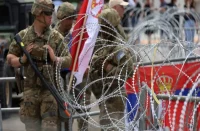

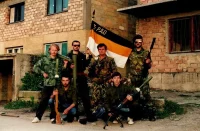











Pingback: Hybrid Wars 5. Breaking the Balkans (VI) | Protestation
Pingback: Hybrid Wars 5. Breaking the Balkans (V) | Oriental Review
Respectful Andrej
I must protest because you use here the USA/CIA biased data for the percentage of Albanian minority in Macedonia, as high as 25,2%…! That’s simplу not true! The results of the census from the US hijacked 2002 census (the then State Census Comity resigned!) were rigged!
The next attempt to make census on 11 October 2011 showed once again the real numbers, and therefore was imediatelly boycotted by the Albanian minority, once they realized that they are below 17% :
http://macedoniaonline.eu/content/view/19334/45/
Please correct the data and do not use American “standards” for reporting.
Re: the Albanian minority, comment from Vasil is correct. At time of 2001 census, one of the Western diplomats said ( maybe Solana, I forget precisely ) “… do what you will but the numbers of Albanians need to be 25%”. The influence of Albanians in Macedonia is however, unproportionately large, due to so-called Ohrid Agreement, ie; as a 5th column in Macedonia supported by the US/EU/NATO. As such, they are amnestied from every wrong-doing, ie; they are untouchable, and proceed on a daily basis with undermining all government institutions where they are “employed” through quotas derived from their non-existant numbers and sore incompetence. Their role essentially is to bleed Macedonia from within in order to weaken her in every way possible, same as SDSM opposition “Macedonian” party. Also, the numbers of ethnic Albanians who support the Macedonian state may include some older generations who have been in Macedonian from “pamtivek” but few today of the newer generations do – I would say over 95% of them support Greater Albania. Finally, Albaninas are slowly gaing territory through quiet ethnic cleansing, moving in, taking over regions, street by street, suburb by suburb etc. In my view, there can be no serious response from Macedonia to Albanian provocations as long as the Balkan is under unipolar US influence.
The problem is the inability or fear of the ruling VMRO DPMNE to act in defence of the state/national interests through fear of US/EU, and “appears” – I say appears because I cannot for certain say what they are doing behind the scenes – to slowly be losing the state. The people who are aware of all facets of US Putch strategy are therefore without leadership. For example, why is Serbian “Kanvas” which is leading the so-called protests/vandalism/destruction, allowed free reign within the country? Why are terrorists such as these, allowed entry into the country? Also, there are no fines for the demonstrator’s actions! They are freely allowed to destroy. And so on.
I would also like to add that the author has overlooked the role of Serbia in destabilisation of Macedonia. He mentions Greek non-recognition of name/identity, Bulgarian non-recognition of language, Albanian irredentist aspirations for the land but does not mention Serbian negation of Macedonian Orthodox Church. Attitude of so-called Serbian patriarchy towards Macedonia is hate-filled, chauvanistic – they deny, belittle, obstruct at every turn and are behind, along with Greek Orthodox CChurch attempts to install Zoran Vranishkovski as Serbofile Church leader behind so called “Ohrid Orthodox Church”, which has been abject failure.
So Macedonia is negated from all sides and from within. However, people are not surrendering in spite of politicians “towing the line”. The lack of leadership and willingness to confront perpetrators of Putch in any way shape of form is alarming.
Please excuse typo – should be 2002 census.
Pingback: Hybrid Wars 5. Breaking the Balkans (V) | Réseau International (english)
Pingback: Hybrid Wars 5. Breaking the Balkans (VI) | Réseau International (english)
Pingback: Portulaca grandiflora | Find Me A Cure
Pingback: Hybrid Wars 5. Breaking the Balkans (VI) | documentation.erlande